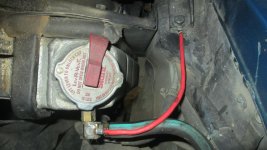And it is the electrolysis that destroys your hoses. Gates has spent millions of dollars creating new "rubber" formulas that resist the damaging effects of electrolysis. Over time you will notice your hoses always get soft and bulge right where they connect to metal and it's the electrolysis that causes that.
When it comes to knowledge of electrolysis nobody knows more than our U.S. Navy.
No it don't!!!
Rubber is an insulator which means it doesn't react to electromotive forces
You see the hoses bulge at the outlet ONLY because the engine heats up during hot soak and the rubber at that point expands more and breaks the internal cords sooner than the rest of the hose.
I have NEVER and I mean NEVER saw a lower radiator hose fail!
And that covers 30+ years
You know toobroke;
If you posed your thoughts as questions or theories instead of "this is how it's done and the rest of you are idiots" you might be taken a little more seriously!
It's amazing how many DIY'S have an idea on how to repair their rides to keep them going and think the rest of the world doesn't have a clue!
Who do they think came up with, designed, engineered, built and tested these things?
And furthermore one who says "I can do brakes, I do mine and my friends all the time"
Hanging pads and rotors on a weekend is NOTHING like doing it for a living, every day, all day along with diagnostics for many crazy problems .
Some make money
Some make a mess
Sent from my SM-N920P using Tapatalk






